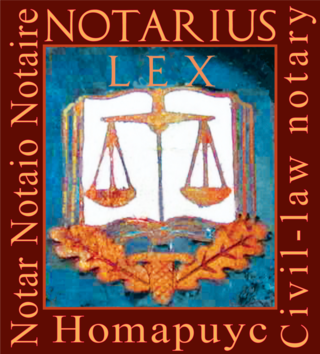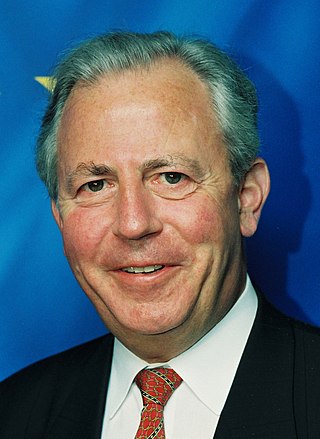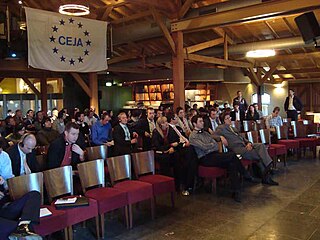
Luxembourg, officially the Grand Duchy of Luxembourg, is a small landlocked country in Western Europe. It borders Belgium to the west and north, Germany to the east, and France to the south. Luxembourg is the only surviving grand duchy in the world. Its capital and most populous city, Luxembourg, is one of the four institutional seats of the European Union and the seat of several EU institutions, notably the Court of Justice of the European Union, the highest judicial authority. Luxembourg's culture, people, and languages are highly intertwined with its French and German neighbors; while Luxembourgish is the only national language of the Luxembourgish people and of the Grand Duchy of Luxembourg, French is the only language for legislation, and all three – Luxembourgish, French and German – are used for administrative matters in the country.

The European Court of Justice (ECJ), formally just the Court of Justice, is the supreme court of the European Union in matters of European Union law. As a part of the Court of Justice of the European Union, it is tasked with interpreting EU law and ensuring its uniform application across all EU member states under Article 263 of the Treaty of the Functioning of the European Union (TFEU).

The Schengen Agreement is a treaty which led to the creation of Europe's Schengen Area, in which internal border checks have largely been abolished. It was signed on 14 June 1985, near the town of Schengen, Luxembourg, by five of the ten member states of the then European Economic Community. It proposed measures intended to gradually abolish border checks at the signatories' common borders, including reduced-speed vehicle checks which allowed vehicles to cross borders without stopping, allowing residents in border areas freedom to cross borders away from fixed checkpoints, and the harmonisation of visa policies.

Civil-law notaries, or Latin notaries, are lawyers of noncontentious private civil law who draft, take, and record legal instruments for private parties, provide legal advice and give attendance in person, and are vested as public officers with the authentication power of the State. As opposed to most notaries public, their common-law counterparts, civil-law notaries are highly trained, licensed practitioners providing a full range of regulated legal services, and whereas they hold a public office, they nonetheless operate usually—but not always—in private practice and are paid on a fee-for-service basis. They often receive generally the same education as attorneys at civil law with further specialized education but without qualifications in advocacy, procedural law, or the law of evidence, somewhat comparable to solicitor training in certain common-law countries.

Jacques Santer is a Luxembourgish politician who served as the ninth president of the European Commission from 1995 to 1999. He served as Finance Minister of Luxembourg from 1979 until 1989, and the 20th Prime Minister of Luxembourg from 1984 to 1995, as a member of the Christian Social People's Party (CSV), which was the leading party in the Luxembourg government between 1979 and 2013. As Prime Minister of Luxembourg he also led the negotiations on the Single European Act, which effectively set aside the 20-year-old Luxembourg Compromise.
Same-sex marriage has been legal in Luxembourg since 1 January 2015. A bill for the legalisation of same-sex marriages was enacted by the Chamber of Deputies on 18 June 2014 and signed into law by Grand Duke Henri on 4 July. Partnerships have also been available in Luxembourg since November 2004.

The Union of European Theatres is an alliance of European public theatres. It promotes European integration through cultural interaction.

The European Confederation of Police (EuroCOP) is the umbrella organization umbrella organisation for 30 police unions and staff organisations in Europe. Representing the interests of over 250,000 police officers in 25 European countries, it was founded in 2002 at a conference in Roskilde, Denmark, emerging from the Union Internationale des Syndicats de Police (UISP), which had existed since 1953. It was created in order to enable further organizations, particularly ones from the United Kingdom, to join. The union's headquarters is in Luxembourg.

Lesbian, gay, bisexual and transgender (LGBT) people in Luxembourg have the same legal rights as non-LGBT people. Partnerships, which grant many of the benefits of marriage, have been recognised since 2004. In June 2014, the Luxembourgish Parliament passed a law enabling same-sex marriage and adoption rights, which took effect on 1 January 2015. Additionally, discrimination on the basis of sexual orientation and "change of sex" in employment, healthcare and the provision of goods and services is outlawed, and transgender people are allowed to change their legal gender on the basis of self-determination.

Leonard Orban is a Romanian independent technocrat who served as the Commissioner for Multilingualism in the European Commission, the executive body of the European Union (EU). He was responsible for the EU language policy and was the first Romanian Commissioner and the first member of the Commission whose portfolio is exclusively multilingualism. His term of office began on 1 January 2007 and ended on 9 February 2010. With a background in engineering and economics, Orban has taken up various posts working for the accession of Romania to the European Union, most prominently as Deputy and later as Chief Negotiator for his country at the time of final negotiations with the European Union.

The Judiciary of the Czech Republic is set out in the Constitution, which defines courts as independent institutions within the constitutional framework of checks and balances.
The European Network Against Racism (ENAR) is an EU-wide network of anti-racist NGOs. ENAR aims to end structural racism and discrimination and advocates for equality and solidarity for all in Europe. It connects local and national anti-racist NGOs throughout Europe and acts as an interface between its member organisations, and the European institutions. It voices the concerns of ethnic and religious minorities in European and national policy debates.

The Conseil Européen des Jeunes Agriculteurs (CEJA) is an umbrella organisation gathering young farmers from all over Europe and is one of the key advocates for the agricultural sector in Europe. This non-profit organisation has, at present, 28 member organisations and one observer members from EU member states, representing around one million young farmers. Its office is located in Brussels.
The Commission of the Bishops' Conferences of the European Union, formerly the Commission of the Bishops' Conferences of the European Community, is the association of Catholic Church episcopal conferences in member states of the European Union (EU) which officially represents those episcopal conferences at EU institutions. COMECE holds two meetings of the Plenary Assembly each year, which set out the main lines of its work. The Apostolic Nuncio to the European Communities participates in these meetings. A seminal issue of the European integration process provides the core theme of each meeting.

The Treaty Establishing the European Stability Mechanism was signed by the member states of the eurozone to found the European Stability Mechanism (ESM), an international organisation located in Luxembourg, to act as a permanent source of financial assistance for member states in financial difficulty, with a maximum lending capacity of €500 billion. It replaced two earlier temporary EU funding programmes: the European Financial Stability Facility (EFSF) and the European Financial Stabilisation Mechanism (EFSM). All new bailouts of eurozone member states will be covered by ESM, while the EFSF and EFSM will continue to handle money transfers and program monitoring for bailouts previously approved for Ireland, Portugal and Greece.

Chafik Rachadi is a Moroccan politician.
A professional order is an organization which, in a given territory, comprises all the members of the same profession, a profession which can generally be exercised in a liberal manner and which ensures a form of regulation of the profession in question.
The International Union of Notaries is a non-governmental organisation. It aims to promote, co-ordinate and develop the function and activities of Notary throughout the world.
In the European continental judicial tradition, the national councils of the judiciary are institutions on judicial administration that ensure the self-management of the judiciary and the effective delivery of justice, which are autonomous or independent of the executive and legislature.












